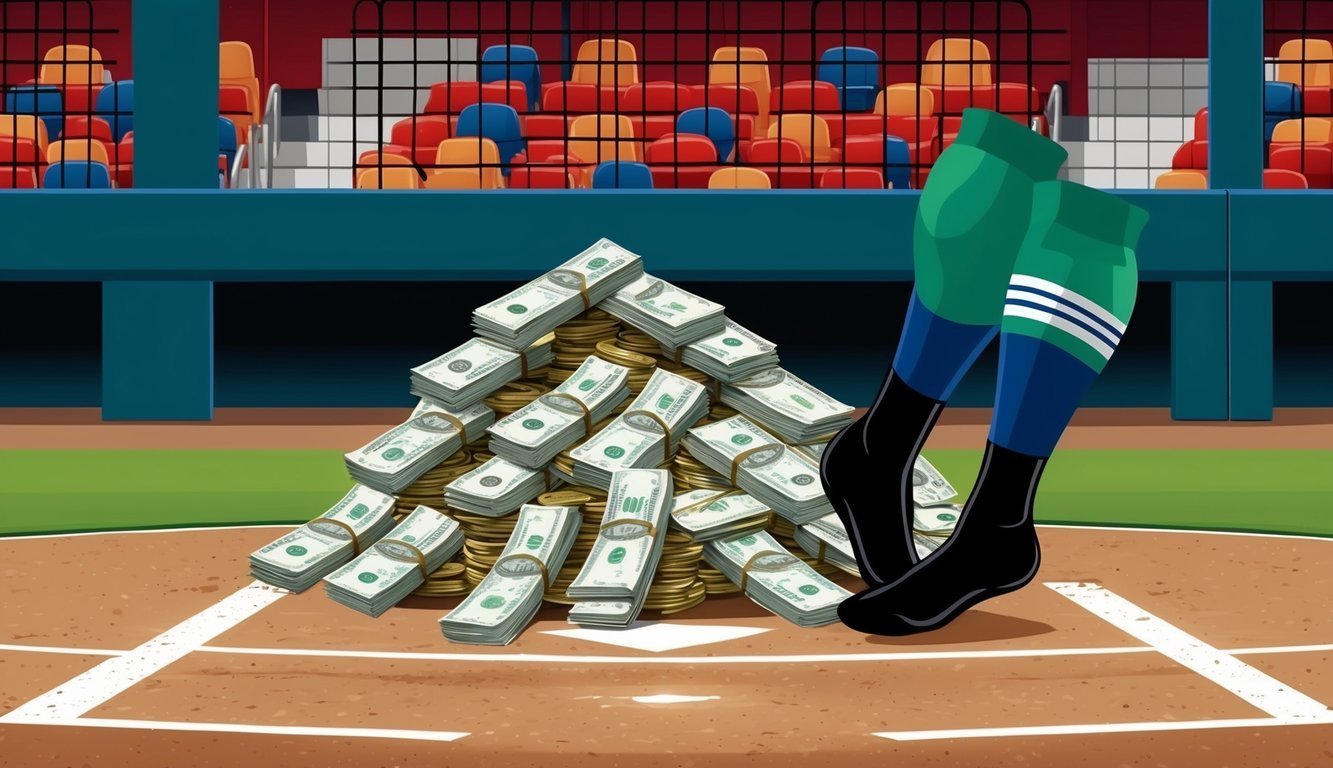The Black Sox Scandal rocked the baseball world in 1919, forever changing America’s pastime.
Eight Chicago White Sox players were accused of intentionally losing the World Series to the Cincinnati Reds in exchange for money from gamblers.
This infamous event led to lifetime bans for the involved players.
It also led to the appointment of baseball’s first commissioner to restore public trust in the sport.
The scandal centered around star outfielder “Shoeless” Joe Jackson and seven of his teammates.
Despite being acquitted in a 1921 trial, all eight players received lifetime bans from professional baseball.
This harsh punishment sent a clear message about the integrity of the game and the consequences of corruption.
The Black Sox Scandal remains one of the most significant events in baseball history.
It exposed the dark underbelly of gambling’s influence on professional sports and sparked major reforms in how baseball was governed.
The story continues to captivate fans and historians alike, serving as a cautionary tale about the importance of fair play and sportsmanship.
Origins of the Black Sox Scandal
The Black Sox Scandal arose from a complex web of players, gamblers, and team management issues surrounding the 1919 World Series.
It centered on allegations that eight Chicago White Sox players accepted bribes to intentionally lose games.
The 1919 Chicago White Sox
The 1919 Chicago White Sox were a talented team with championship potential.
They won the American League pennant that year, earning a spot in the World Series against the Cincinnati Reds.
Despite their success, many players felt underpaid and mistreated by team owner Charles Comiskey.
This discontent created fertile ground for corruption.
The team’s star players included “Shoeless” Joe Jackson, Eddie Cicotte, and Buck Weaver.
These talented athletes would soon become embroiled in one of baseball‘s darkest chapters.
Key Figures: Players and Gamblers
Eight White Sox players were ultimately implicated in the scandal:
- Eddie Cicotte (pitcher)
- Joe Jackson (outfielder)
- Chick Gandil (first baseman)
- Swede Risberg (shortstop)
- Buck Weaver (third baseman)
- Fred McMullin (utility infielder)
- Lefty Williams (pitcher)
- Happy Felsch (outfielder)
On the gambling side, several figures played key roles.
Arnold Rothstein, a well-known New York gambler, was alleged to be the mastermind behind the fix.
Other gamblers involved included Joseph “Sport” Sullivan and Abe Attell.
The players reportedly received varying amounts of money to throw the series.
Cicotte and Jackson, two of the team’s best players, were said to have received $10,000 each.
The 1919 World Series Fix
The 1919 World Series became infamous for a game-fixing conspiracy that rocked baseball to its core.
Eight Chicago White Sox players were accused of intentionally losing games against the Cincinnati Reds in exchange for money from gamblers.
The scandal led to a major investigation and resulted in the permanent banishment of several players from baseball, casting a long shadow over the sport’s integrity.
Despite the tarnished reputation, the 1919 World Series still featured some memorable World Series highlights, including stunning performances by the Reds and pivotal moments that captivated audiences.
The fallout from the conspiracy ultimately prompted the establishment of stricter regulations to safeguard the game from future corruption.
The Series Against Cincinnati Reds
The heavily favored White Sox faced the Cincinnati Reds in the best-of-nine 1919 World Series.
Suspicions arose when the Reds took an early lead, winning five games to three.
Unusual plays and uncharacteristic errors by White Sox players raised eyebrows among fans and sportswriters.
Key games saw star pitcher Eddie Cicotte hit the first Reds batter with his second pitch – a rumored signal that the fix was on. Shoeless Joe Jackson, despite his .375 batting average in the Series, became embroiled in the scandal due to his association with the other accused players.
The Role of Media and Sportswriters
Sharp-eyed sportswriters played a crucial role in uncovering the scandal.
Hugh Fullerton, a respected journalist, noticed peculiar plays and betting patterns.
He meticulously charted suspicious activities during the games.
Fullerton’s careful observations and subsequent articles helped bring the conspiracy to light.
Other reporters also picked up on unusual occurrences, fueling public speculation about the integrity of the games.
The media’s scrutiny ultimately pressured baseball officials to launch a formal investigation into the allegations of game-fixing.
Unraveling the Conspiracy
As rumors swirled, the truth began to emerge.
In 1920, a grand jury was convened to investigate the scandal.
Several players confessed to their involvement in the conspiracy.
Evidence pointed to a complex network of gamblers, including the infamous Arnold Rothstein, who allegedly bankrolled the fix.
The eight implicated White Sox players – dubbed the “Black Sox” – faced trial but were acquitted due to missing evidence.
Despite the legal outcome, newly appointed Commissioner Kenesaw Mountain Landis banned all eight players from professional baseball for life, sending a strong message about the sport’s integrity.
Trials and Banishments

The Black Sox Scandal led to legal proceedings and severe consequences for the accused players.
Their fates were shaped by a criminal trial, a powerful new baseball commissioner, and lifetime bans from the sport they loved.
The Grand Jury and Criminal Trial
In September 1920, a grand jury convened to investigate the allegations of game-fixing.
Several players, including Shoeless Joe Jackson, confessed to their involvement.
The grand jury indicted eight White Sox players and five gamblers on charges of conspiracy to defraud.
The criminal trial began in June 1921.
Despite seemingly strong evidence, including player confessions, the jury found all defendants not guilty.
This surprising verdict was partly due to missing evidence – key confessions had mysteriously disappeared from the courthouse.
Many speculated that jury nullification played a role, with jurors reluctant to punish their baseball heroes.
The acquittals were met with mixed reactions from the public and the baseball world.
Judge Kenesaw Mountain Landis
In the wake of the scandal, baseball owners appointed federal judge Kenesaw Mountain Landis as the first Commissioner of Baseball.
They gave him broad powers to clean up the sport’s image.
Landis wasted no time in making his mark.
Despite the not guilty verdicts, he banned all eight accused players from professional baseball for life.
His famous statement declared:
“Regardless of the verdict of juries, no player who throws a ballgame, no player that undertakes or promises to throw a ballgame, no player that sits in conference with a bunch of crooked players and gamblers where the ways and means of throwing a game are discussed and does not promptly tell his club about it, will ever play professional baseball.”
Impact on Players’ Lives and Careers
The banishments had profound effects on the accused players:
- Shoeless Joe Jackson: Despite his .356 career batting average, Jackson was permanently excluded from Hall of Fame consideration.
- Buck Weaver: Maintained his innocence but was banned for knowing about the fix and not reporting it.
- Eddie Cicotte: The star pitcher’s career ended abruptly at age 36.
Most struggled financially after baseball.
Some found work in semi-pro leagues or non-baseball jobs.
The stigma of the scandal followed them for life, affecting their reputations and relationships.
Their stories became cautionary tales about the consequences of gambling in baseball.
The harsh punishments set a precedent that continues to influence MLB’s strict anti-gambling policies today.
Legacy and Cultural Impact

The Black Sox Scandal left an indelible mark on baseball and American culture.
Its ripple effects transformed the sport’s governance, inspired creative works, and sparked ongoing debates about player reinstatement.
Baseball’s Attempt to Cleanse Itself
After the scandal, Major League Baseball took swift action to restore public trust.
The league appointed Kenesaw Mountain Landis as the first Commissioner of Baseball in 1920.
Landis wielded absolute power to protect the game’s integrity.
He banned the eight accused players for life, even after their acquittal in court.
The American League, led by Ban Johnson, supported these measures.
New rules were implemented to curb gambling influences.
Teams were required to report any suspicious activities.
These changes aimed to reassure fans that baseball was committed to fair play.
Eight Men Out: From Scandal to Literature and Film
The Black Sox Scandal captured the public imagination, inspiring numerous books and films.
Eliot Asinof’s 1963 book “Eight Men Out” became the definitive account of the event.
It meticulously detailed the players’ motivations and the scandal’s unfolding.
John Sayles adapted the book into a critically acclaimed film in 1988.
The movie brought the story to a new generation, humanizing the players while exploring the complexities of the scandal.
It starred John Cusack and Charlie Sheen, helping to cement the Black Sox in popular culture.
The Hall of Fame and Reinstatement Efforts
The scandal’s legacy continues to impact Hall of Fame discussions.
Shoeless Joe Jackson, despite his .356 career batting average, remains ineligible for Cooperstown due to his alleged involvement.
This has sparked ongoing debates about his culpability and potential reinstatement.
Efforts to clear Jackson’s name have persisted for decades.
In 2015, the Shoeless Joe Jackson Museum petitioned MLB Commissioner Rob Manfred for reinstatement.
The request was denied, but the controversy endures.
Baseball historians and fans continue to argue about the fairness of the lifetime bans and whether time has come for reconciliation.
Continuing Debates and Modern Relevance

The Black Sox Scandal continues to spark discussions and comparisons in baseball circles today.
Its impact on the sport’s integrity and the ongoing questions about player culpability keep the story relevant over a century later.
The Arguments for Innocence and Guilt
Some baseball historians argue for the innocence of certain players implicated in the scandal.
Joe Jackson and Buck Weaver, in particular, have vocal supporters.
These advocates point to Jackson’s stellar performance in the 1919 World Series and Weaver’s consistent claims of innocence.
Critics argue that even if some players didn’t actively try to lose games, their knowledge of the fix and failure to report it makes them complicit.
The debate often centers on the definition of corruption in sports and the ethical responsibilities of players.
Legal experts continue to examine the case, questioning the fairness of the players’ lifetime bans given their acquittal in court.
This raises intriguing questions about justice in sports versus the legal system.
Comparison to Modern Scandals in Baseball
The Black Sox Scandal serves as a touchstone when discussing more recent controversies in baseball.
The steroid era and sign-stealing scandals have drawn comparisons to the 1919 event in terms of their impact on the sport’s integrity.
Some argue that modern scandals, while damaging, don’t match the severity of throwing the World Series.
Others see similarities in how they shake public faith in the game.
The Black Sox affair has influenced how Major League Baseball handles misconduct.
Today’s strict policies on gambling and game-fixing trace their roots to the aftermath of 1919.
Media portrayals, from “Eight Men Out” to more recent documentaries, keep the scandal in the public eye.
These works often explore themes of redemption, justice, and the cultural significance of baseball in American life.
